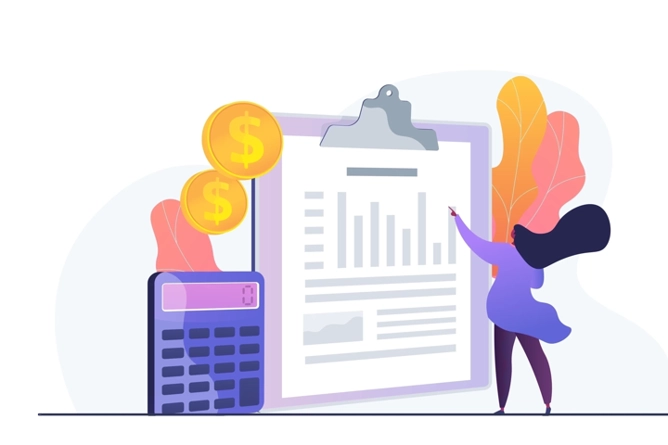
Tax Class in Germany - All you need to know [2025] - Live In Germany
If you have moved to Germany then you should know about the Taxes in Germany and most important their Tax Classes. It is recommended for all the employed people to know the importance of tax classes in Germany. Let us make it clear that the tax class in Germany is only relevant to workers. If you are an employee, keep reading. In this article, we have explained the six tax classes in Germany and how to find which class belongs to your and how much you have to pay for your corresponding tax class. Mainly the biggest portion of your salary goes to the income tax, then comes the social security contributionsafter that we have other taxes like solidarity tax, VAT and Church Tax.
Beside this, we will also provide you with details on the different tax classes and tax types. Moreover, we have also answered your most frequently asked questions like “How to calculate the taxable amount?”, “What is the income rate in Germany?” and “What is the tax refund and how to apply for it?”.
Individual Income Taxes in Germany
Before we begin working in Germany, we should get enough knowledge about income tax, tax class and other taxes briefly.
The individual income tax (Einkommensteuer) applies to everyone who is either living in Germany or employed there. Though, there is up to €11,604 minimum untaxed allowance for single person and €23,208 for married person as per 2024.
What is Income Tax and How much is Income Tax in Germany?
The amount paid to the government from your earnings is Income Tax. If you are employed then this amount is automatically deducted from your gross salary and what you get in your bank account is your net pay. This way, your employer pay the taxes the German Tax Office (Finanzamt) on your behalf. Beside the income Tax, the employers also deduct any other social security contributions.
The tax-free income (Grundfreibetrag) for 2024 is up to €11,604. An income tax rate of 42% is charged for amounts exceeding €66,761. The rich tax (Reichensteuer) is 45% which begins at an income of €277,825. In the process of calculating your income tax, you have to differentiate between marginal tax rate and average tax rate. The resultant amount is the actual one which you pay. Most of the time it less than the marginal tax rate.
A Sample Calculation Of Wage Tax Rates In 2024
| Gross Income (Taxable) | Income Tax Rate (Marginal) | Income Tax Rate (Average) | Tax Amount | Remaining Net Income |
|---|---|---|---|---|
| €10.000 | 14.03% | 0.02% | €2 | €9998 |
| €15.000 | 24,00% | 6,37% | €955 | €14.045 |
| €20.000 | 26,06% | 11,04% | €2.207 | €17.793 |
| €40.000 | 34.32% | 20.62% | €8.246 | €31.754 |
| €60.000 | 42% | 26,55% | €15.932 | €44.068 |
| €80.000 | 42% | 30.42% | €24.332 | €55.668 |
| €300.000 | 45% | 39,13% | €117.397 | €182.603 |
Progressive Tax: A Definition
In Germany, tax is calculated on the bases of the progressive taxation system, which means that if you earn more than you pay more taxes than the person who earns less. The above table clearly shows income tax for different salaries. If you want to know how much income tax you will pay on your gross salary, then check out this calculator.
How Much I Will Make After Taxes?
First you have to calculate your weekly wage or monthly wage in this scenario. After that, you will deduct the income tax and contributions related to social security. This is based on the bracket you fall into. If you are looking for a hassle-free option, an online German income tax calculator can help you finding out the take-home amount after tax and related deductions.
German Tax Classes
| German Tax Class | Marital Status |
|---|---|
| Tax Class 1 | For Employees with the marital status of Single, widowed or divorced |
| Tax Class 2 | For single parents employees, living separately |
| Tax Class 3 | For Married employes with children and only if the other spouse has chosen Tax Class 5 |
| Tax Class 4 | For married employees with both spouses earning similar income |
| Tax Class 5 | For married employees with a significantly lower income than your partner in Tax class 3 |
| Tax Class 6 | For all the employees who are receiving wages from more than one employer. |
In the case of married couples, the combination of tax classes 3 and 5 is possible only if both spouses are living in Germany.
In this case, if the spouse is living in their home country, tax class 1 will be applied to you. Once your spouse gets registered in Germany, then you can go apply for a tax class change.
How Can I Identify My Tax Class In Germany?
After registering in Germany, you will get the tax ID within six weeks. This ID will then go to your employer. Most of the time, the German Tax Office (Finanzamt) assigns you the tax class on the bases of your marital status, which you mention when you register the first time at the city registration office (Rathaus) Likewise, the employer is informed by tax authorities.
Once the tax ID and tax class are informed to the employer, they can calculate the deductions. but till that time, your employer will deduct the highest tax rate applicable to your. Don’t worry, once your employer gets your tax class from the Finanzamt, they will adjust the extra deducted tax in your next payslip. The tax class can be seen on the payslip under SKI (Steuerklasse).
How Can I Pay Less Tax In Germany?
Tax declaration
An annual tax declaration needs to be filed by self-employed people. There are couple of platforms that can be used for tax returns. For such assistance, opting for a “Steuerberater” is recommended.
When I am eligible for Tax refund in Germany?
A tax return is not compulsory for employed individuals. Though, it is sometimes wise to go for it. You may be entitled to a tax refund if you haven’t been in Germany for a complete tax year.
What is the Deadline of Tax Return in Germany of 2023 which you submit in 2024?
31st May is the deadline for submitting your tax returns in Germany, but due to COVID they have set the 2nd September the new deadline date. It is still valid in 2024. The tax years goes parallel with the calendar year of Germany.
How to Change Tax Class in Germany?
Tax class can be changed either online using elster or with the form. Here is the complete guide for changing tax class.
Wondering How to Change Your Tax Class?
Check out our detailed article on Change Tax Class in Germany.
Other Taxes
There are several other taxes in Germany which are significant. If you are living in Germany, it’s better that you are aware of them. This includes solidarity tax, church tax, and VAT.
What is Solidarity Tax in Germany?
The solidarity tax (*Solidaritätszuschlag)* couples up with the income tax. It applies to everyone earning more than €972. These people have to pay a contribution of up to 5.5%. It is then removed from your wages. After the reunification, this tax was introduced back in 1991. The purpose was to invest and rebuild Eastern Germany. The Solidarity Tax still helps in financing the recurring costs related to a unified Germany.
What is Church Tax in Germany?
It doesn’t matter if you are Jewish or Christian because if you are registered with your religious congregation then you need to pay the Church Tax (*Kirchensteuer)*. The tax amount is collected from your gross salary. It is collected along with social security contributions and income tax. Out of your gross salary, around 8 to 9% is charged as Church Tax.
How much is VAT in Germany?
The VAT or Value Added Tax (*Mehrwertsteuer)* is paid by registered members for all of the non-essential and luxury items. The standard VAT is currently rated at 19%. There is a reduced rate of 17% VAT for items like flowers and books.
Seconded (Temporary Transfer) Employees in Germany
Many employees move to Germany as a seconded employee, this could be either from their employee or their own request of moving to Germany to gain the international experience. The seconded employees remain employed with the same company. This makes sure that the seconded employees are still active on the payroll of their home country. This way, they pay tax at home.
As their employer is not based in Germany, that’s why they are not tax liable in Germany. The Seconded employee pay their taxes where they are tax resident. Due to this reason, the seconded employees are also not obliged to make contributions to social security inside Germany. This rule applies in all EEA (European Economic Area) countries. On the other hand, there are some other countries that have the same agreement as Germany. The rule of secondment usually applies to 2-year secondments. While there is still a possibility of increasing the tenure up to 5 years.
Conclusion
Tax class in Germany is decided by your marital status. The choice of tax class is allowed only after getting married. The income of both spouses can decide if a change in tax class makes sense. If it makes sense, they receive a temporary tax advantage on their monthly income. With this in mind, remember that the income tax amount per year remains identical.
Source: Infographic vector created by vectorjuice – www.freepik.com

Jibran Shahid
Hi, I am Jibran, your fellow expat living in Germany since 2014. With over 10 years of personal and professional experience navigating life as a foreigner, I am dedicated to providing well-researched and practical guides to help you settle and thrive in Germany. Whether you are looking for advice on bureaucracy, accommodation, jobs, or cultural integration, I have got you covered with tips and insights tailored specifically for expats. Join me on my journey as I share valuable information to make your life in Germany easier and more enjoyable.





